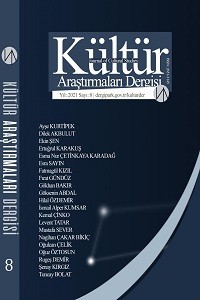Öz
Yaşanan süreçte teknolojinin imkânları kullanılarak iletişim araçlarından haberler, reklamlar, diziler vd. yollarla yayılan bilgi, davranış ve yaşama şekli örnekleri, toplumsal yaşamı biçimlemektedir. Çok uluslu şirketler marifetiyle gelişmiş kapitalist ülkelerin kültürü ve dolayısıyla değerler sistemi dünyada hâkim kültür şekline dönüşmektedir. Batı ülkelerinden dünya ülkelerine güler yüzlü bir eda ile sunulan tüketim kültürünün hâkimiyetindeki insanların ihtiyaçları da tabiî olmaktan anormalliğe yönelmektedir. Tabiî ihtiyaç, insanın karşılamadığı zaman bedenen ve zihnen üreticiliğinden uzaklaşacağı, kendine, ailesine ve topluma karşı ödev ve sorumluluklarını yerine getiremeyeceği yokluktur, sıkıntıdır. Kişinin istek, arzu ve özenmesiyle meydana gelen ihtiyaçlar ise, yapay ihtiyaçtır, lükstür. Yaşanılan süreçte insan, hayatını insanca, tabiî şekilde sürdürmek yerine, tüketmek için yaşayan bir varlığa dönüşmektedir. Bu süreçte çok uluslu şirketler, insanların sahip olma, tüketme, statü elde etme vd. isteklerini canlı tutarak küresel ölçekte üretilen ürünlerin tüketilmesini sağlamaktadırlar. Moda ve reklamlar yoluyla gereksiz, olmasa da olur türünden insan isteklerini, insanların temel ihtiyaçlarıymış gibi sunan ekonomik yapı, böylelikle kendi işleyişini de sağlamaktadır. Bu durum karşısında akıl, mantık, inanç ve irade sahibi her insanın ihtiyaçlarını doğru teşhis etmesi, “gönüllü basitlik yaklaşımı”nı benimsemesi gerekir. Bu yolla çevreye (insana ve tabiata) saygılı ve koruyucu etkinlikte bir tüketim gerçekleşecektir ki bu da insanî olandır. Çalışmamızda, ihtiyaç ve tüketim kültürü ilişkisinin tüketici davranışları üzerindeki etkenleri irdelenmiştir.
Anahtar Kelimeler
Kaynakça
- Baudrillard, Jean (2017). Tüketim Toplumu. Çev. Ferda Keskin ve Nilgün Tutal. İstanbul: Ayrıntı Yayınları.
- Capra, Fritjof (1992). Batı Düşüncesinde Dönüm Noktası. Çev. Mustafa Armağan. İstanbul: İnsan Yayınları.
- Chaney, David (1999). Yaşam Tarzları. Çev. İrem Kutluk. Ankara: Dost Yayınları.
- Horkheimer, Max (1998). Akıl Tutulması. Çev. Orhan Koçak. İstanbul: Metis Yayınları.
- Illich, İvan (2000). Tüketim Köleliği. Çev. Mesut Karaşahan. İstanbul: Pınar Yayınları.
- Marshall, Gordon (1999). Sosyoloji Sözlüğü. Çev. Osman Akınhay ve Derya Kömürcü. Ankara: Bilim ve Sanat Yayınları.
- Odabaşı, Yılmaz (2013). Tüketim Kültürü: Yetinen Toplumdan Tüketen Topluma. İstanbul: Sistem Yayıncılık. URL-1: “İhtiyaç”. www.sozluk.gov.tr (Erişim Tarihi: 20.9.2020).
- URL-2: “İhtiyaçlar”. https://evrimagaci.org/maslowun-ihtiyaclar-hiyerar-sisi-hayatta-kalmak-icin-nelere-ihtiyac-duyariz-1644 (Erişim Tarihi: 07.9.2020).
- URL-3: “İhtiyaçlar”. https://www.kisiselgelisim.com/maslow-ihtiyaclar-hiyerarsisi-yasam-ve-motivasyon/ (Erişim Tarihi: 07.9.2020).
- Ülken, Hilmi Ziya (1969). Sosyoloji Sözlüğü. İstanbul: MEB Yayınları.
- Yaran, Rahmi (2000). “İhtiyaç”. TDV İslam Ansiklopedisi, C. 21. İstanbul: Türkiye Diyanet Vakfı, 573-574.
Öz
Information, behavior and lifestyle examples, which are disseminated by means of news, advertisements, TV series, etc. using the possibilities of technology, shape social life. With the help of multinational companies, the culture of the developed capitalist countries and therefore the value system is transforming into the dominant culture in the world. The needs of people under the consumption culture, which is presented with a gracious decency from Western countries to the world countries, change from being natural to anomaly. The natural need is an absence, trouble, that when a person is not met, he will be physically and mentally distant from his productiveness, and cannot fulfill his duties and responsibilities towards himself, his family and society. The needs that occur with the desire, desire and care of the person are artificial needs, luxury. In the process, man turns into a living creature to consume instead of continuing his life humanely and naturally. Within this period, multinational companies, people owning, consuming, obtaining status, etc. By keeping their demands alive, they ensure the consumption of globally produced products. The economic structure that presents unnecessary, if not possible, human desires as if they were the basic needs of people through fashion and advertisements, ensures its own functioning. Under these circumstances, every person with reason, logic, belief and will should diagnose their needs correctly and adopt the "voluntary simplicity approach". In this way, a respectful and protective consumption will be achieved to the environment (human and nature); which is also human. In our study, the relationship between need and consumption culture and the factors on consumer behavior will be examined.
Anahtar Kelimeler
Kaynakça
- Baudrillard, Jean (2017). Tüketim Toplumu. Çev. Ferda Keskin ve Nilgün Tutal. İstanbul: Ayrıntı Yayınları.
- Capra, Fritjof (1992). Batı Düşüncesinde Dönüm Noktası. Çev. Mustafa Armağan. İstanbul: İnsan Yayınları.
- Chaney, David (1999). Yaşam Tarzları. Çev. İrem Kutluk. Ankara: Dost Yayınları.
- Horkheimer, Max (1998). Akıl Tutulması. Çev. Orhan Koçak. İstanbul: Metis Yayınları.
- Illich, İvan (2000). Tüketim Köleliği. Çev. Mesut Karaşahan. İstanbul: Pınar Yayınları.
- Marshall, Gordon (1999). Sosyoloji Sözlüğü. Çev. Osman Akınhay ve Derya Kömürcü. Ankara: Bilim ve Sanat Yayınları.
- Odabaşı, Yılmaz (2013). Tüketim Kültürü: Yetinen Toplumdan Tüketen Topluma. İstanbul: Sistem Yayıncılık. URL-1: “İhtiyaç”. www.sozluk.gov.tr (Erişim Tarihi: 20.9.2020).
- URL-2: “İhtiyaçlar”. https://evrimagaci.org/maslowun-ihtiyaclar-hiyerar-sisi-hayatta-kalmak-icin-nelere-ihtiyac-duyariz-1644 (Erişim Tarihi: 07.9.2020).
- URL-3: “İhtiyaçlar”. https://www.kisiselgelisim.com/maslow-ihtiyaclar-hiyerarsisi-yasam-ve-motivasyon/ (Erişim Tarihi: 07.9.2020).
- Ülken, Hilmi Ziya (1969). Sosyoloji Sözlüğü. İstanbul: MEB Yayınları.
- Yaran, Rahmi (2000). “İhtiyaç”. TDV İslam Ansiklopedisi, C. 21. İstanbul: Türkiye Diyanet Vakfı, 573-574.
Ayrıntılar
| Birincil Dil | Türkçe |
|---|---|
| Konular | Kültürel çalışmalar |
| Bölüm | Araştırma Makaleleri |
| Yazarlar | |
| Yayımlanma Tarihi | 8 Mart 2021 |
| Yayımlandığı Sayı | Yıl 2021 Sayı: 8 |


